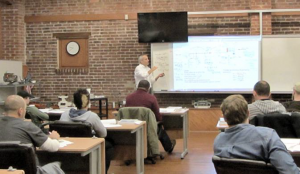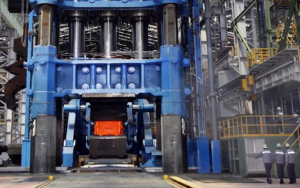INDUSTRIAL FLUID POWER (IFP) PROGRAM
Our most requested training courses are the first three level courses offered by Applied Motion Technologies, Inc./ITTC:
- Getting Started with Hydraulics (GSH)
- Industrial Hydraulic Principles (IHP)
- Hands on Hydraulics (HOH).
The intent of these courses is to introduce students to hydraulic fluid power, components, circuits, capabilities, safety and applications. These courses are intended to develop depth of knowledge as students progress through each course. Because of the course’s integration and popularity, they have been combined into a comprehensive program – IFP. To qualify for program entry, an applicant must pass both a reading and math assessment provided during the week of the GSH class.
The IFP Program consists of three one-week courses (a total of 96 hours of training) that may be conveniently scheduled throughout the year to accommodate student’s work schedule availability. The program objective is intended to provide new and current employees within the hydraulic industry a comprehensive entry level understanding of hydraulic fluid power. The program allows both entry level employees/students to learn core competencies within this field, as well as provide expanded learning to existing employees in order to advance their knowledge and careers. This program helps to prepare individuals to become certified by the Industrial Fluid Power Society.
Schedule
GSH – Getting Started with Hydraulics
- October 30, 2023
- February 5, 2024
- April 22, 2024
- June 24, 2024
- August 19, 2024
- October 21, 2024
- December 16, 2024
- To
- To
- To
- To
- To
- To
- To
- November 3, 2023
- February 9, 2024
- April 26, 2024
- June 28, 2024
- August 23, 2024
- October 25, 2024
- December 20, 2024
IHP – Industrial Hydraulic Principles
- January 8, 2024
- March 18, 2024
- * May 13, 2024
- July 29, 2024
- September 16, 2024
- November 18, 2024
- To
- To
- To
- To
- To
- To
- January 12, 2024
- March 22, 2024
- * May 16, 2024
- August 2, 2024
- September 20, 2024
- November 22, 2024
HOH – Hands On Hydraulics
- August 21, 2023
- December 11, 2023
- March 4, 2024
- June 10, 2024
- August 12, 2024
- October 7, 2024
- December 2, 2024
- To
- To
- To
- To
- To
- To
- To
- August 25, 2023
- December 15, 2023
- March 8, 2024
- June 14, 2024
- August 16, 2024
- October 11, 2024
- December 6, 2024

The US is undergoing the biggest turnover of its workforce in its history. Many of the newer American industrial maintenance workers are stepping into their positions with limited formal training or experience with hydraulic fluid power (industrial hydraulics). Attempting to read and interpret schematics, troubleshoot and maintain hydraulic‐powered machines without any training can be a daunting task. This 5‐day training course is the first step in the development of maintenance and technical personnel that need to understand their hydraulic powered and controlled equipment.
This first step hydraulic training course concentrates on developing students’ understanding of industrial hydraulic fundamentals. These fundamentals include: characteristics of fluid pressure, fluid flow, fluid power, cylinder and hydraulic motor speed control and system heat production. Students will understand the purpose, function, operation and hydraulic schematic symbols for all major hydraulic valves and pumps. This training includes ample hands‐on lab exercises to reinforce the classroom lecture. We want our students to come prepared to be challenged in the classroom and the lab.

5-day training course

one week course (32 hours)
This final 5-day course completes the Industrial Fluid Power (IFP) Program. This course focuses on hydraulic valve and control circuits. This course offers more detailed learning and hands on training through self-directed labs.
Students will learn system relief valve troubleshooting including setup considerations for fixed displacement pumps, how to properly set a spike pressure relief valve when used with a pressure compensated variable displacement pump and how to evaluate hot running hydraulic systems. This course focuses in more detail on hydraulic pumps in comparison to the two previous courses. This includes determining why the hydraulic pump’s electric drive motor shuts down on overload and troubleshooting worn pumps. Additionally, understanding and properly setting up a pressure compensated pump, a remote pressure compensated pump, a load sensing/meter in pressure compensated pump, and finally a horse power-controlled pump. This course emphasizes fluid cleanliness standards.
Students will be able to identify the difference between meter-in and meter out speed control and when meter-out speed control cannot be used. In depth discussions and learning are conducted on understanding stack valve systems by properly reading and interpreting a hydraulic schematic as well as properly assembling D03 stack valve systems according to a hydraulic schematic.
Students will learn how to properly check accumulator pre-charge pressure and add nitrogen to an accumulator. Students will setup a counterbalance circuit in the lab, learn the proper configuration of a hydraulic circuit when flow controls, counterbalance and load holding valves are all used to control the operation of a cylinder circuit. Students will understand the application of various directional control spool types.
Throughout this course and program completion, students will develop troubleshooting techniques and develop schematic reading and interpretation techniques.
The courses (GSH, IHP, HOH) when enrolled in the IFP Program are $1,875 per student per course. The $150 registration fee, books and supplies are included in tuition costs. This does not include any necessary travel or overnight accommodations.
The cumulative tuition is $5,625. ($150 registration fee + $5,475 tuition)
Students may pay per course upon scheduling at an individual tuition cost of $1,875 due upon the start of each respective course.
Students may pay per course upon scheduling at an individual tuition cost of $1,875 due upon the start of each respective course.
ADMISSIONS REQUIREMENTS
Student will demonstrate through an enrollment-qualifying assessment that their reading skill level is equal to or better than 11th grade standard. Their reading level will be assessed using a standard recognized testing method. Successful completion of the Reading Assessment requires a score of 67% or a minimum of 20 out of 30 correct answers.
Students will demonstrate through an enrollment-qualifying assessment that their general mathematical skill level is equal to or better than 6th grade standard. Their mathematical level will be assessed using a standard recognized testing method. Successful completion of the Math Assessment requires a score of 67% or a minimum of 8 out of 12 correct answers.
The student must be 18 years of age or older on or before the commencement of the class. The student must have a high school diploma or GED equivalent.
Note: There is no reading or math assessment cost to an employer or to the student/applicant.
A completed Registration and Enrollment form is required prior to attendance.

